De Nederlands-Indische schrijfster Maria Dermoût (eigenlijk Helena Anthonia Maria Elisabeth Dermoût-Ingerman) werd geboren in Pekalongan, Java, op 15 juni 1888. Zie ook alle tags voor Maria Dermoût op dit blog.
Uit: Toeti
„Nog meer ingespannen dan tevoren, haar gezicht donker, haar zwarte ogen bedroefd, de mond getrokken. “Ach,” zei zij, en toen, “ach ja, je hebt wel gelijk dat wij alleen… maar zeg dat maar niet hardop, waarvóór eigenlijk, het doet zoveel verdriet om alleen te zijn hé Tsjalie, en soms,” haar hele gezicht oplichtend in haar glimlach, “soms even zijn wij toch niet alleen, als wij…” Zij zweeg, verschrikt voor het grote woord liefhebben.’
(…)
‘Een ogenblik bleven Charles en zij achter in de binnengalerij, zij liepen naast elkaar; zonder iets te zeggen nam Charles haar hand in de zijne, hield die vast zoals mensen dat doen die straks afscheid van elkaar zullen nemen. “Toeti,” zei hij tegen haar naast hem. Hij liet haar hand weer los voordat zij de achtergalerij inliepen. Hij dacht – waarom wist hij zelf niet -aan een ander afscheid, en hoe zijn moeder gezegd had “trouw moet blijken”. Hij herinnerde het zich heel duidelijk alsof het nu was: hij hoorde de woorden, zó was het! Hij keek even naast zich, en dít was het’.
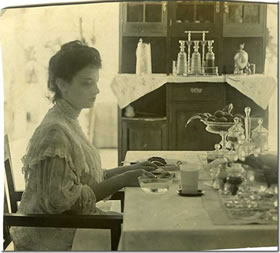
Maria Dermoût (15 juni 1888 – 27 juni 1962)
De Amerikaanse schrijver Christian Bauman werd geboren op 15 juni 1970 in Easton, Pennsylvania. Zie ook alle tags voor Christian Bauman op dit blog.
Uit: Voodoo Lounge
„When you go, you go for real. And there is no time more real than 3:00 A.M. Sergeants’ time, it’s called. Zero three hundred. Zero dark early.
On the old Army boat, the general-quarters bell rang twice for wake-up at 0300. The bell didn’t matter; those who’d slept had been up for at least half an hour. Most of the thirty-four soldiers hadn’t slept. In warm bunks and cold latrine stalls they’d all felt the engines throttle down at 0245, the hard rattle in the bulkheads reduced to a low buzz as the vessel went from full speed to barely making headway through the Caribbean waters.
The echo of the bell died in empty steel passageways, replaced by the hollow silence of nothing to say, nothing to talk about. Cigarettes went to lips, Zippo lids flipped back. Brown T-shirts came down over heads, camouflage BDU blouses buttoned up. The skeleton crews on night watch wiped oil from the gray sides of the diesels, raised binoculars to eyes on the bridge wings, listened to quiet static on the marine bands, made coffee.
In a cramped, two-bunk crew cabin the soldier everyone called Jersey sat in the only chair, bent over, pulling speed-laces tight on a black jungle boot, tucking ends. The door opened, Dick Wags in blue engine-room coveralls, hands in pockets. The light from the passage behind framing a tight face.
“Roomdog,” Dick Wags said, with deep-voice Dick Wags drama. “Voodoo Lounge awaits.”
Jersey looked up, snorted, said, “Please.” The soldier tapped a Marlboro against the ashtray, bent to tie the other boot. Dick Wags was from northeast Jersey, Jersey from northwest. Dick Wags was Dick, sometimes Rick. Jersey was Jersey, except to Dick Wags; to Dick Wags, Jersey was Roomdog. Everyone’s roomdog was Roomdog. It wasn’t complicated.“
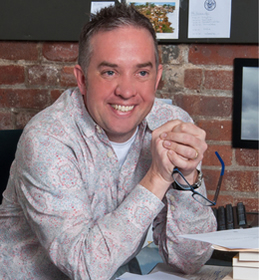
Christian Bauman (Easton, 15 juni 1970)
De Duitse dichteres en schrijfster Silke Scheuermann werd geboren op 15 juni 1973 in Karlsruhe. Zie ook alle tags voor Silke Scheuermann op dit blog.
Lepra
ein Märchenschock war am Anfang
die einfache Injektion einer Landschaft
in einen Körper, damit er praller wirkt, zugleich lebloser,
der Botrox-Effekt, seine Ausbreitung: überall tote Feengesichter
gut und böse sind nicht mehr paritätisch verteilt,
da die künstlichen Muskel der
Sprache verkümmert sind, zu
billigem Material, das das Gesicht einer Frau modelliert
und ihren Körper, den wir einmal in
Sturmaugen, Felsmund, Flußtränen zergliederten,
in Schneegeschlechter, Salzlippen.
Kerkerhirn, Eisfinger
aufteilen konnten, in seine
Blitznerven, Erdzunge,
Wolkenbrüste, und jedes Organ
hatte seinen Stammplatz, genau wie Herzeleid
keinen gehabt hat
angenommen, drei Wünsche wären offen, einzudringen
in die fiktionale Struktur der Schönheit, was wäre, wir
wollten den Felsmund geschlossen, daß
der Mund, von dem
man gerne sagt, er sehe aus wie ein Schnitt,
nicht mehr da sei, nur ein glattes Stück Haut das
nach dem Messer sucht, ein vergleichsweise
kleiner Schauplatz,
der den Wind stumm sein läßt, der das Elend aufsaugen kann, und
dieser zielgerichtete Wunsch könnte uns dann
gegen die Last aller Platitüden von gestern aufwiegen, wir
wären mehr als federgewichtig, weißt du
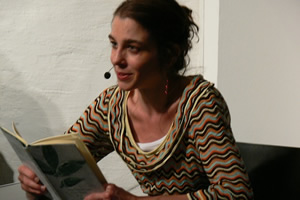
Silke Scheuermann (Karlsruhe, 15 juni 1973)
De Franse schrijver en journalist Roland Dorgelès (eig. Roland Lécavelé) werd geboren op 15 juni 1885 in Amiens. Zie ook alle tags voor Roland Dorgelès op dit blog.
Uit: Les Croix de bois
„- Ils attaquent !
Gilbert et moi avons bondi ensemble, assourdis. Nos mains aveugles cherchent le fusil et arrachent la toile de tente qui bouche l’entrée.
– Ils sont dans le chemin creux !
Le cimetière hurle de grenades, flambe, crépite. C’est comme une folie de flammes et de fracas qui
brusquement éclate dans la nuit. Tout tire. On ne sait rien, on n’a pas d’ordres : ils attaquent, ils sont dans le chemin, c’est tout…
Un homme passe en courant devant notre trou et s’abat, comme s’il avait buté. D’autres ombres passent, courent, avancent, se replient D’une chapelle ruinée, les fusées rouges jaillissent, appelant le barrage1. Puis le jour semble naître d’un coup ; de grandes étoiles blafardes crèvent au-dessus de nous, et, comme à la lueur d’un phare, on voit naître des fantômes, qui galopent entre les croix. Des grenades éclatent, lancées de partout. Une mitrailleuse glisse sous une dalle, comme un serpent et se met à tirer, au tir rapide, fauchant les ruines.
– Ils sont dans le chemin, répètent les voix.
Et, aplatis contre le talus, des hommes lancent toujours des grenades sans s’arrêter, de l’autre côté du mur.
Par dessus le parapet, sans viser, les hommes tirent. Toutes les tombes se sont ouvertes, tous les morts se sont dressés, et, encore aveuglés, ils tuent dans le noir, sans rien voir, ils tuent de la nuit ou des hommes.“
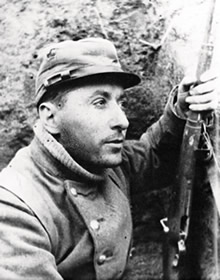
Roland Dorgelès (15 juni 1885 – 18 maart 1973)
In 1915
De Mexicaanse dichter Ramon Lopez Velarde werd geboren op 15 juni 1888 in Jerez. Zie ook alle tags voor Ramon Lopez Velarde op dit blog.
Wet Earth
Wet earth of liquid evenings when the rain
whispers and girls soften
under the redoubled pelting of the drops
of the roof terrace.
Wet earth of odoriferous evenings when
misanthropy toils up to the lascivious
solitudes of air and on them lights
with the last dove of Noah;
while the thunder crackles tirelessly
along the miry clouds.
We evenings of steaming earth when I
acknowledge I am made
of clay, for the summer tears, beneath
the auspice of the light that is half gone,
the soul turns to water on the nails
of its cross.
Evenings when the telephone invites
naiads known for their knowingness,
who leave their bath for live,
to strew their fatuous tresses on the bed
and to lisp, with perfidy and profit,
damp and panting monosyllables
as the fine rain harries the window-panes….
Evenings like an alcove under the sea,
its bed its bath;
evenings when a maiden
grows old in front of her extinguished hearth,
waiting for a swain to bring her a live coal;
evenings when on earth
angels descend to plough unerring furrows
on edifying fallows;
evenings of supplication and Pascal candles;
evenings when the squall
incites me to inflame
each frigid maiden with the opportune coal;
evenings when, my soul
oxidized, I feel
an acolyte of camphor,
slightly swordfish, slightly
Saint Isidore Labrador….
Vertaald door Samuel Beckett
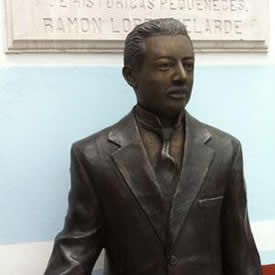
Ramon Lopez Velarde (15 juni 1888 – 19 juni 1921)
Standbeeld in Jerez
De Canadese dichter en schrijver François-Xavier Garneau werd geboren op 15 juni 1808 in Ville de Québec. Zie ook alle tags voor François-Xavier Garneau op dit blog.
Le Marin
La nuit est noire et le ciel sans étoiles;
Le vent mugit et frappe, en vain, nos voiles
Que durcissent les frimas.
Adieu patrie ! adieu, plus d’espérance.
Adieu ma femme et ma chère Clémence,
Vous ne me reverrez pas.
De la tempête augmente la furie;
La mer blanchit le navire qui crie,
C’en est fait, nous coulons bas!
Adieu patrie ! adieu, plus d’espérance.
Adieu ma femme et ma chère Clémence,
Vous ne me reverrez pas.
Vous m’attendez à cette heure peut-être,
Et vous croyez toujours me voir paraître
Froid et couvert de frimas.
Adieu patrie ! adieu, plus d’espérance.
Adieu ma femme et ma chère Clémence,
Vous ne me reverrez pas.
Au cap lointain vaccille une lumière…
Mais le vaisseau brisé sombre à l’arrière,
Tous s’élancent dans les mâts.
Adieu patrie ! adieu, plus d’espérance.
Adieu ma femme et ma chère Clémence,
Vous ne me reverrez pas.
Tout disparut sous la vague profonde;
Et le marin qui luttait contre l’onde
Répétait encor tout bas:
Adieu patrie ! adieu, plus d’espérance.
Adieu ma femme et ma chère Clémence,
Vous ne me reverrez pas.
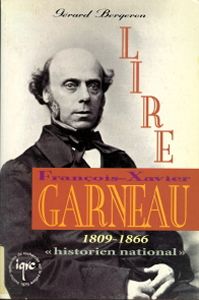
François-Xavier Garneau (15 juni 1809 – 2 februari 1866)
De Noorse schrijver Trygve Emanuel Gulbranssen werd geboren in Oslo op 15 juni 1894. Zie ook alle tags voor Trygve Gulbranssen op dit blog.
Uit: The Wind From the Mountains (Vertaald door Naomi Walford)
“There was a grand Christmas at Björndal after this good year. Major Barre and Aunt Eleanor came and there followed feasting and dancing and voluble speeches at the table and catches and boisterous songs.
Some of the guests found it hard to stomach sitting at the table with all the manor-people on Christmas Eve, and be solemn with Bible and church-candles in the middle of the table, and listen to Dag reading the Christmas text. It was still worse when the old man broke up and went to bed quite early, giving it out as a decree that every one would be called in the small hours for the drive to the early Christmas service. What sort of treatment was that for people of position?
They were not at all consoled by being awakened with a dram of spirits and a snack: they dreaded the drive in the night cold and growled angrily. But the singing of the sleigh bells and the glow of the torches and the solemnity in church worked upon them as on others; and what was naive and genuine in them responded through the fog of protest which they had believed to be their attitude to life.“
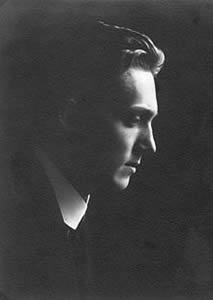
Trygve Gulbranssen (15 juni 1894 – 10 oktober 1962)
